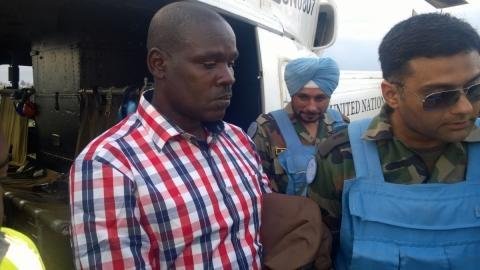Kagom
Senior Member
It really makes you wonder, doesn't it? This man says he saved people, but now you read this and the fact of the matter is: is he telling the truth or is he lying?"Hotel Rwanda" hero in bitter controversy
By Arthur Asiimwe Wed Apr 4, 8:37 AM ET
KIGALI (Reuters) - To much of the outside world, Paul Rusesabagina is a hero who saved 1,200 people from genocide in events depicted in the Oscar-nominated film "Hotel Rwanda."
But as the genocide's 13th anniversary approaches in his native Rwanda, a bitter row has erupted between Rusesabagina and critics, including President Paul Kagame, who say he is profiting from the victims' misery and rewriting Rwanda's history for his own gain.
Some 800,000 Tutsis and moderate Hutus were butchered in 100 days in the central African nation from April 6, 1994.
Soldiers of the then Hutu-led government and ethnic militia allies orchestrated the genocide in which victims were hacked to death with machetes, burned alive or shot.
The 2004 movie depicting Rusesabagina, a hotel manager who used his connections with the Hutu elite to protect Tutsis fleeing militiamen, echoed Steven Spielberg's "Schindler's List," the story of a businessman saving 1,100 Jews from the Nazis.
Rusesabagina received the United States' highest civilian award, the Presidential Medal of Freedom, for heroism during Rwanda's dark days.
But back home, he has sparked outrage with warnings of another genocide, this time by Tutsis against Hutus, and for claims that war crimes by Tutsis during the 1994 conflict were being overlooked by biased traditional courts.
"Rusesabagina is no Schindler," columnist Job Jabiro wrote in Rwanda's New Times daily in February.
"Publicity hound, genocide revisionist, promoter of ethnic hate speech ... shamelessly banking on the genocide and endangering the survivors."
Rusesabagina, who lives in Belgium with his family and tours Western countries lecturing, says critics are waging a campaign against him for airing what he calls uncomfortable truths.
'HOLLYWOOD FICTION'
Many events in the film directed by Terry George and starring Don Cheadle were based on Rusesabagina's memoirs, yet survivors of the Hotel des Mille Collines have disputed Rusesabagina's version of events.
Pasa Mwenenganucye was a receptionist, portrayed in the film as Gregoire, a hedonistic worker who occupies the presidential suite and sips champagne as killings escalate.
"The movie is Hollywood fiction. If it's (supposed to be) a true story, then it's a basket of lies," he told Reuters.
Mwenenganucye, furious at the way he was portrayed, accused Rusesabagina of kicking out refugees who failed to pay their bills, a charge Rusesabagina denies.
"To such people I tried to be fair," Rusesabagina told Reuters in a phone interview. "But they were celebrating, serving themselves from the cellar. No survivor has said 'he charged and kicked me out for not paying'."
Shortly after the premiere of the film, which was shot in South Africa, Rwanda's President Kagame, a Tutsi, called it a "falsehood," saying Rusesabagina was not an appropriate symbol of heroism.
The killings ended when Tutsi rebels, led by Kagame, seized control and triggered an exodus of more than 2 million Hutus.
Rusesabagina, whose father was Hutu but mother and wife were Tutsi, said Kagame was jealous of the limelight: "He has taken himself to be the only hero."
Tempers boiled over last January when Rusesabagina warned in a Reuters interview that Rwanda could be headed for another round of bloodletting unless Kigali stops punishing killers from "only one side" of the deadly conflict.
Rusesabagina said justice for the 100,000 mostly Hutus tried in traditional Gacaca courts had been "slow and biased," punishing Hutu killers but overlooking Tutsi war crimes.
HATE SPEECH
Critics have since spewed vitriol at Rusesabagina, accusing him of voicing the anti-Tutsi hate that fanned the genocide.
Rusesabagina shrugs off such charges: "If I really wanted Tutsis killed, I could have done it at the time."
Others accuse him of creaming money from the Hotel Rwanda Rusesabagina Foundation charity.
"Ask him what he has done for survivors from whose story he's making that money," said Odette Nyiramirimo, who survived the genocide at Rusesabagina's hotel.
"I'm helping other humanitarian organizations with it," Rusesabagina replies. "I can't go to Rwanda personally because of my own security. There's a government campaign against me."
Rusesabagina accuses Kagame of secretly arming Tutsi militias, set up for community policing, against Hutus.
"Before 1994 it was a Hutu militia group -- today it's the local defense forces, a Tutsi militia, which is intimidating and killing people on hills of Rwanda," Rusesabagina told Chicago public radio last month.
This criticism most deeply stings the government, which sees its crowning achievement as bringing stability and ethnic reconciliation to the war-ravaged country.
"Whoever says Tutsis are killing Hutu or Hutus are killing Tutsis is trying to divert us from a good process we had started," Fatuma Ndagiza, head of Rwanda's Unity and Reconciliation commission, told Reuters.
(Additional Reporting by Tim Cocks in London)
http://news.yahoo.com/s/nm/20070404/wl_canada_nm/canada_rwanda_genocide_film_col


